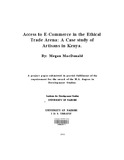| dc.description.abstract | As e-commerce increases its reach as the premier vehicle for global consumerism, the expectation exists that the benefits will reach producers in all comers of the globe. This study endeavoured to explore whether artisan groups in the developing world are experiencing the benefits of e-commerce by gaining direct access to consumers.
Following a case study approach, the study identified one commerce arena ethical trade, and three artisan groups in Kenya whose goods were being sold on an ethical trade website pioneered by one of the world's largest e-commerce companies. 01 Malo Designs, Bombolulu Workshops and Jorova Craftswere selected based on their geographic diversity in Kenya and the different partners they worked with that led to their participation in the website WorldofGood.com.
The study groups' history in the ethical trade arena, established relationships with international partners and desire to understand and increase their market impact ensured their willing participation in this study. The study identified the structures and process that facilitated each artisan group's participation on the website World of Good.com. The study finds that wholesale buyers from the west remain critical components of e-commerce participation by artisan groups in Kenya.
The benefits of e-commerce remain a stepremoved from artisan groups, who continue to lack the technology, resources or an overalle-commerce paradigm in which to maximize their participation in this growing market vehicle. This study recommends that the government in Kenya enact and enforce policies to foster education, training and access to information technology resources. This can compliment the role of the buyers whose partnership with artisan groups remains critical. These buyers can assist in the training and exposure of artisan groups to the e-commerce platform. Such policy and training assistance can help promote an institutional shift in the artisan groups as they begin to conceptualize the new frontiers offered bye-commerce as a whole. | en_US |

